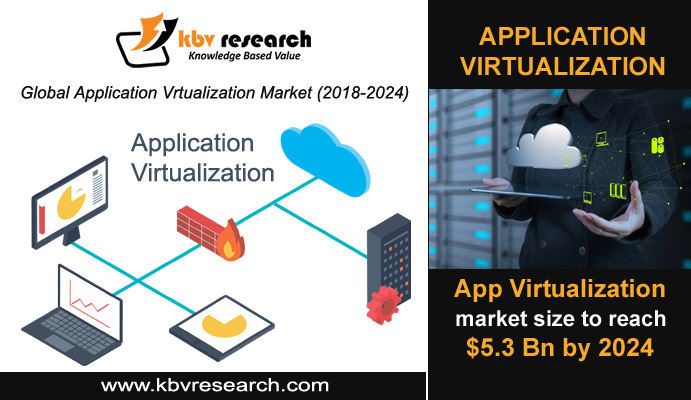What is Application Virtualization?
Application virtualization can be understood as a software technology which implements the encapsulation of an application to isolate it from its host Operating System. The output of this isolation process leads to the independence of the operating system, which can also be considered as one of the top advantages of deploying the application virtualization technology. Encapsulation is a fundamental and a crucial factor which enables the operation of applications within artificial, or “virtual” environment.
While a plethora of solutions is available for virtualizing applications, IT teams often resort to a server- based approach, which can help with delivering the applications without installing them over individual desktops. Rather, administrators incorporate remote applications on a server within the company’s data centre or with a hosting service and then deliver the applications to the users’ desktops.
Why do we need application virtualization?
With application virtualization, users can implement an application remotely from a server. This server can store all the personal information and other characteristics of an application, yet, it can run on any local workstation. For example, a user needs to run two different versions of similar software would adopt the application virtualization technology.
This technology enables organizations to run applications that would otherwise conflict with a user’s desktop applications or with other virtualized applications. The virtualized applications can be accessed either from thin clients or non-Windows computers. Applications are available immediately, without waiting for long installation or loading operations. If a computer is lost or stolen, the server has sensitive app data that will not be affected.
4 ways Application Virtualization can provide benefits to enterprises:
- Simplified application retirement: Getting rid of an application within an entire network gets much easier with the help of the application virtualization technology. Reason being, virtualized apps do not need to be uninstalled, rather, they just have to be deleted.
- Numerous runtime environments: Companies can set up the runtime environment coupled with the application. This helps organizations to run multiple versions of a runtime environment over a desktop. For example, they can operate different Java versions all together without messing around with environment variables.
- Abridged roaming: Some products enable settings and data from the app to be saved on a server or memory stick in a virtual environment. This allows end users to use their own settings to access their apps on any desktop they log in. This can also be done if companies are not using roaming profiles.
- Reduced size and number of VDI/Desktop images: VDI’s advantages are often limited by inefficient application deployment. Just as it is important to maintain the integrity of VDI pictures with physical construction. Companies can split the application from the operating system by implementing the application virtualization, making images smaller and far less painful reconstruction. To keep software fresh and bug-free, software companies constantly update apps at any time without any trouble. These patches can be pushed directly into the devices by virtualization technologies such as Cloud paging, and updates will take place in the background immediately. Updates are also possible without interrupting user workflows at any time.
Click Here For Free Insights: https://www.kbvresearch.com/news/application-virtualization-market/
Which industries are reaping major benefits from the Application Virtualization technology?
Banking, Financial Services, and Insurance (BFSI)
The Banking, Financial Services, and Insurance (BFSI) industry offer a significant prospect of growth for suppliers since the industry is rapidly digitalizing and must save capital expenses (CAPEX) for additional IT needs. This is why applications are increasingly used as virtualization solutions as these offer the benefits of scalability, flexibility and greater cost -saving, business continuity and business agility for the use of various applications on their virtual machines. As a result of this, the increasing adoption of app virtualization solutions offers the advantages of scalability and flexibility to utilize different applications with higher cost savings, continuity and agility on the virtual machine.
Healthcare
Application virtualization can significantly benefit any healthcare institution by delivering highly efficient access to shared records, improved security, and easy transition to mobile. Since electronic health records (EHR) have a necessity to be shared among different doctors, specialists, and facilities, it is crucial than ever before to make that information easily accessible as it is secure. Health institutions can share documents incompatible formats and maintain up-to-date and accessible records easily. Health care professionals are known for their constant movement and a new record must be easily accessible with each patient. There’s just no time to look for data in such a fast environment. The doctor-patient’s interaction is normally achieved if every file and application is available on a tablet or laptop.
IT and Telecom
Often, IT teams adopt a server-based approach, providing applications without having to install them on a desktop. The next step is the virtualization of applications for mobile devices. Virtualization not only facilitates the migration of mobile apps across servers and support in a virtual environment, but it also helps vendors to develop virtual apps running on sophisticated phones and other mobile devices. For IT managers, ROI dollars are directly affected by hardware virtualization right away. The ramifications of application virtualization in a highly mobile world are less direct, more long-term and possibly significant.
What does the future look like?
The concept of application virtualization is applied in a number of fields outside the previously explored methodologies. The use of app virtualization in the world of games is not new. Many modern games involve writing non-player personal behaviour and the use of languages that perform byte codes for other games. Just as the virtualization of a platform (or system) changed the way of supplying and managing servers and desktops, virtualization continues to offer efficient mechanisms for removing an application from its host system. Because this approach is so popular, an evolution of software and hardware will be interesting to make application virtualization even more flexible and more efficient.
Furthermore, the worldwide market for Application Virtualization Market is being projected to grow at a CAGR of 14.4% over the forecast period.

Comments